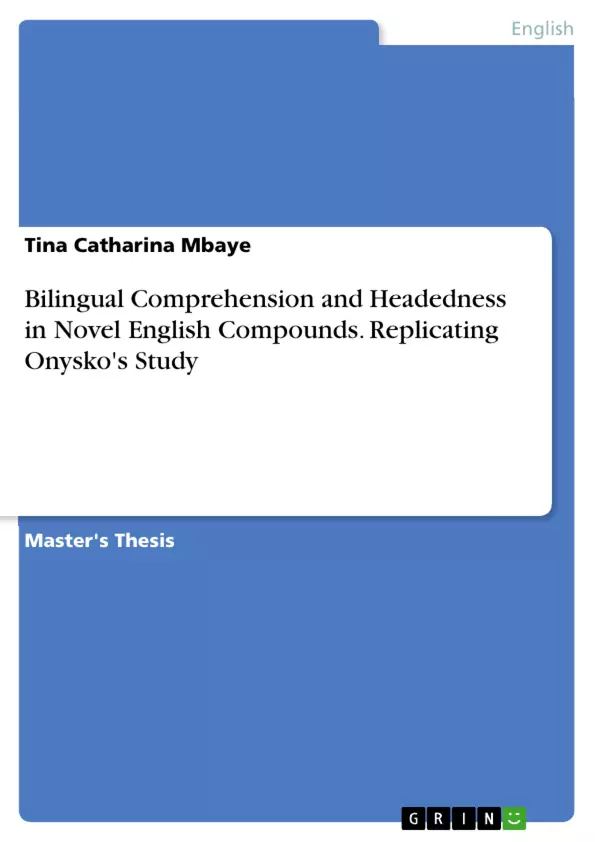The goal of this master's thesis is to explore the influence of bilingualism on the interpretation of novel English noun compounds by replicating Alexander Onysko's 2016 study "Crosslinguistic influence on headedness of novel English compounds."
This research delves into how speakers of te reo Māori, a language with postmodification, comprehend newly formed English compounds compared to monolingual English speakers. The replication study, albeit with a smaller participant pool of 35 compared to Onysko's 116, substantiates the original findings.
Inhaltsverzeichnis (Table of Contents)
- Introduction
- Bilingualism Research on Compounding
- Example: French (Nicoladis, 1999; Nicoladis, 2002)
- Example: Persian (Foroodi-Nejad & Paradis, 2009)
- Example: Māori (Onysko & Degani, 2014)
- Outline of the Study
- Compounding in Te Reo Māori and English
- The Compound Meaning Interpretation Task
- Participant Selection and Degrees of Bilingualism
- Establishing Headedness from Participant Replies
- Results of Headedness Interpretations
- The Role of Crosslinguistic Influence for Left-headed Interpretations
- Outline of the Replication of the Study with Te Reo Māori Today
- Replication Methodology
- Replication Participants
- Determination of the Head in the Replication
- Results of Headedness Interpretations in the Replication of the Study
- Chi-square Tests of Independence
- Examination for Possible Participant and Gender Bias
- The Role of Crosslinguistic Influence in the Replication of the Study
- Comparison of Research Results
Zielsetzung und Themenschwerpunkte (Objectives and Key Themes)
This master thesis aims to replicate and validate the findings of Alexander Onysko's 2016 study, which investigated the influence of bilingualism on the interpretation of novel English noun compounds. Onysko hypothesized that bilinguals speaking languages with differing typological features for compound modification (pre- vs. post-modification) would exhibit different interpretations of novel English compounds compared to monolingual English speakers. The study aimed to determine whether bilingualism in languages like te reo Māori, with its postmodifying structure, impacts the interpretation of English compounds, where the head is typically found on the right.
- The impact of bilingualism on the interpretation of English noun compounds
- The role of typological differences in compounding (pre- vs. post-modification) on bilingual comprehension
- The relationship between bilingual proficiency and the tendency towards left-headed interpretations
- The replication and validation of previous research findings on crosslinguistic influence in compounding
- The potential influence of participant factors (such as bilingual proficiency levels) on compound interpretation
Zusammenfassung der Kapitel (Chapter Summaries)
The thesis begins by introducing the concept of compounding and its significance in language, focusing on headed compounds. It then dives into existing research on bilingualism and compounding, examining specific examples like French, Persian, and Māori. Chapter 3 provides an outline of the study, detailing the approach to analyzing te reo Māori and English compounding, the compound meaning interpretation task, and participant selection based on bilingualism levels. It also outlines the process of identifying the head based on participant responses.
Chapter 4 presents the results of the headedness interpretations, highlighting the differences in interpretations among different participant groups. Chapter 5 explores the influence of crosslinguistic influence on left-headed interpretations, analyzing the impact of te reo Māori on bilingual participants' understanding of English compounds. The next chapter outlines the replication of the study, describing the methodology, participant selection, and the process of identifying the head in the replicated experiment. Chapter 7 presents the results of the replication, focusing on chi-square tests of independence and potential participant and gender bias. Finally, Chapter 8 explores the role of crosslinguistic influence in the replicated study and compares the findings of the original and replicated studies.
Schlüsselwörter (Keywords)
The central keywords and focus topics include bilingualism, compounding, headedness, crosslinguistic influence, te reo Māori, English, typological features, pre-modification, post-modification, compound interpretation, experimental methodology, replication, and participant factors.
- Quote paper
- Tina Catharina Mbaye (Author), 2023, Bilingual Comprehension and Headedness in Novel English Compounds. Replicating Onysko's Study, Munich, GRIN Verlag, https://www.grin.com/document/1415081



